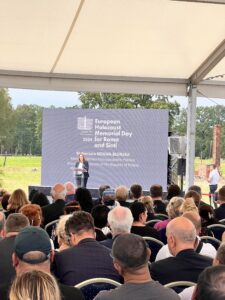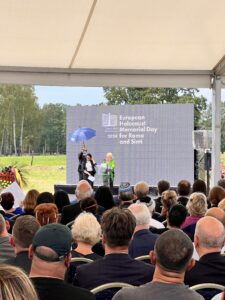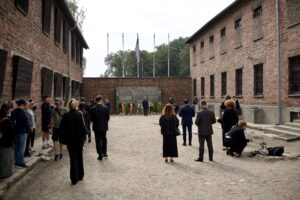Quite a few articles in the Slovak press for the 80th anniversary of the destruction of the Roma camp in Auschwitz Birkenau.
- Prezident Peter Pellegrini odsúdil pri spomienke na rómsky holokaust šírenie ideológií nenávisti.In: Aktuality. 02.08.2024. https://www.aktuality.sk/clanok/klUCpt6/prezident-peter-pellegrini-odsudil-pri-spomienke-na-romsky-holokaust-sirenie-ideologii-nenavisti/
- Okrem vzdania úcty obetiam išlo aj o varovanie pre súčasnosť. InL Košice online. 04.08.2024. https://www.kosiceonline.sk/kosicania-si-uctili-obete-genocidy-romov
- V Košiciach si uctili obete genocídy Rómov počas druhej svetovej vojny. In: Teraz. 03.07.2024. https://www.teraz.sk/spravy/v-kosiciach-si-uctili-obete-genocidy-r/813239-clanok.html
- Rómsky holokaust zasahuje do súčasnosti, nevraživosť má nové formy, tvrdí splnomocnenec pre rómske komunity. In: HN Online. 02.08.2024. https://hnonline.sk/slovensko/96162468-romsky-holokaust-zasahuje-do-sucasnosti-nevrazivost-ma-nove-formy-tvrdi-splnomocnenec-pre-romske-komunity
- V priestoroch Múzea holokaustu v Seredi sa pri príležitosti Pamätného dňa genocídy Rómov v období holokaustu uskutoční spomienkové podujatie. In: Sered Sity. 01.08.2024. https://seredsity.sk/v-priestoroch-muzea-holokaustu-v-seredi-sa-pri-prilezitosti-pamatneho-dna-genocidy-romov-v-obdobi-holokaustu-uskutocni-spomienkove-podujatie/
- V múzeu v Seredi si v piatok pripomenú Pamätný deň rómskeho holokaustu. In: Teraz. 01.08.2024. https://www.teraz.sk/najnovsie/v-muzeu-v-seredi-si-v-piatok-pripomenu/812663-clanok.html
















